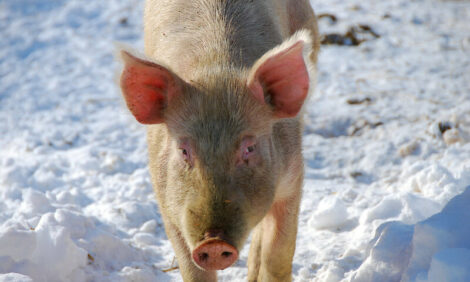



Positive perception of hog farms good news for pork producers
BANFF - Separating the perception of hog producing from the reality is a key to better attitudes towards hog production in rural communities, says an associate professor from the University of Guelph. |
In a presentation to attendees of the Banff Pork Seminar in Banff, Alberta Jan.
20, Wayne Caldwell outlined the results of a research project in Ontario that
studied several sizeable livestock operations and the perceptions of their
neighbours.
Caldwell called the results a "good news story" for livestock operators. In
general, it was found that once neighbours were exposed to the realities of hog
production in their environment, they were more likely to change previously held
negative perceptions of the industry.
"The research was an effort to better understand why conflicts arise and how to
prevent them," says Caldwell. "The study provides an important framework for the
agricultural industry to develop approaches to prevent and deal with community
issues more effectively."
Fifty livestock operations from across Ontario, each with over 150 livestock
units and having operated for at least five years, were chosen for the research.
Of the 50 operations, 21 were hogs, 10 dairy, 11 beef and eight poultry.
Four hundred landowners in direct proximity to the farms were contacted and 180
of those surveyed responded. Almost three-quarters of the participants had
resided at their location before the neighbouring operation was built or
expanded.
The producers received generally good reviews from their neighbours in regards
to their agricultural practices and their quality as neighbours. Eighty-one
percent of those surveyed had never expressed a concern about the neighbouring
livestock operation.
Sixty-nine percent said farmers are good stewards of the land and 70 percent
said they are good at taking care of their animals. Over half of the respondents
said that farm operators apply manure to their fields appropriately.
Co-operation between livestock operators and their neighbours generally improved
after construction, regardless of pre-construction protests. This was partially
the result of operators taking proactive measures such as holding open houses,
says Caldwell. "The proactive approaches taken by the farmers usually overcame
the previous negative perceptions."
Good communication between the producers and their neighbours was a key factor
in a more harmonious situation. "When it comes to positive neighbour relations,
an ounce of prevention is worth a pound of cure," says Caldwell. "A good
neighbour policy makes a great difference."
Many of the producers involved in the research followed this "good neighbour
policy" by advising neighbours of field activity such as spraying fields or
spreading manure, holding open houses, providing employment in the community and
generally having an open door policy towards their neighbours.
Caldwell recommends that operators prepare a communications plan that addresses
as many concerns as possible before they build or expand. Listening to
neighbour's concerns one-on-one is also valuable. "This approach to mediating
conflict has a higher probability of reducing conflict compared to formal
litigation," he says.
With fewer and fewer people having connections to the farming community,
Caldwell says education can play a crucial role in developing a positive
relationship between operators and neighbours.
"Fear often arises due to lack of knowledge. Education about farming practices
can go a long way in calming fears," he says. "Operators taking the time to
inform neighbours of the practices in their barns and fields enable neighbours
to understand the operation, make educated decisions and create a positive
relationship."
The Banff Pork Seminar is co-ordinated by the Department of Agricultural, Food
and Nutritional Sciences, University of Alberta, in co-operation with Alberta
Pork, Alberta Agriculture, Food and Rural Development and other pork industry
representatives from across Canada. More information is available on the Seminar
Web site, www.banffpork.ca.
Source: Banff Pork - 24th January 2006






